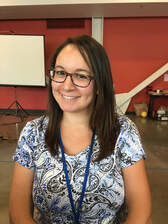
Position: Speech-Language Pathologist (SLP)
What led you to your current position: I have been working as an SLP for a few years. I got into this field, because I had an interest in linguistics and neuroscience. I loved that this area combines those two areas of study to support people in their ability to communicate and engage with others. For kids, sometimes this is setting up a whole system via pictures or with a device. For others, this could be supporting their attempts, usually through misinterpreted behaviors, with more effective outlets to make wants and needs known. My transition from a medical setting to Seneca was to move into work with kids and from an interest in Seneca’s approach towards the supportive systems that are in place in schools or those that need to be developed.
Fun Fact/Quote: I love cooking! I wanted to be a chef and applied to Le Cordon Bleu in Paris. I didn’t end up going, because my parents thought I should pursue a “sensible career”. So, I indulge in my hobby now as a method of relaxation after a long day!
What does your average day look like: I work at several different schools, but for the most part the routine is similar. I arrive, check in with staff about upcoming events in the school (e.g., testing, field trips, community events, etc.). Then, I review or create materials for my planned sessions. I go to different classrooms and pull my assigned students. Therapy looks different depending on who and what is being treated (e.g., a 5-year-old with an articulation disorder vs. a 12-year-old with challenges sequencing a story). I, typically, see students in individual or small groups (usually 2 students). Then, I have to document (aka. Write down and interpret everything we did in session). I usually check in with teachers for students who are demonstrating challenges and “spy” on them in their classes to get an idea of potential strategies. This may lead to a Tier 2 intervention, but sometimes it helps teachers with Tier 1, and their individual teaching strategies. I write a lot of reports and attend meetings to share information with families and the school about student’s who would benefit from additional support. Sometimes, I get to give good news that the student is doing so well, we can exit them from speech therapy!
Why do you do this work: I really believe that Seneca’s model of Unconditional Education is a livable philosophy. For me, this means that throwing the best resources to support each student’s success gives that individual the best opportunity to not only make it, but excel in this world. I believe that my unique skill set as an SLP allows for me to participate in this framework in a meaningful way.

 RSS Feed
RSS Feed